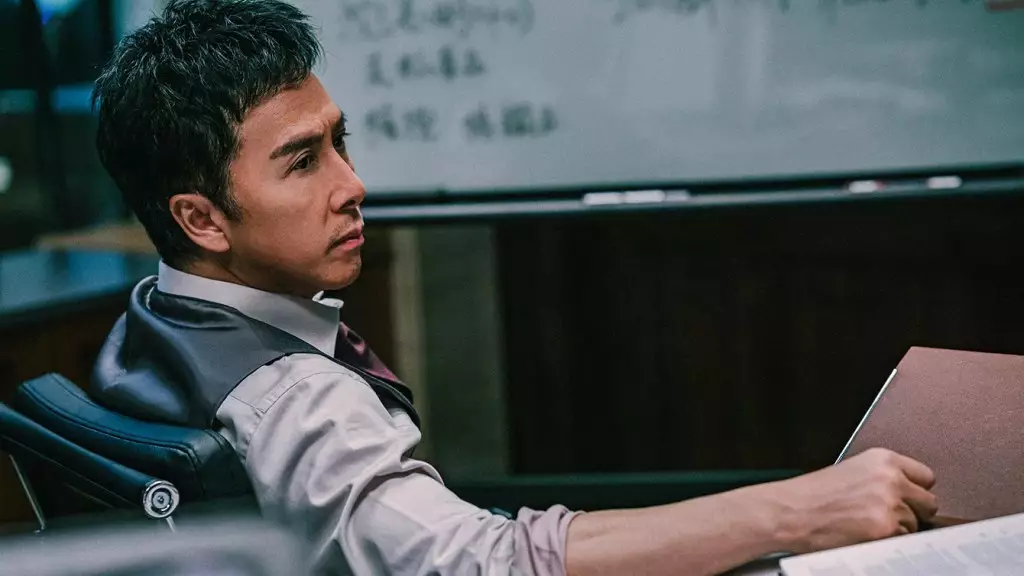The intersection of justice and action comes alive in Donnie Yen’s latest cinematic endeavor, *The Prosecutor*. This film presents Yen not only as the lead actor but also as the director, showcasing his attempt to pivot from traditional martial arts narratives to a courtroom drama that grapples with the complexities of the legal system in Hong Kong. However, while the film offers a fresh take on legal storytelling, it raises questions about its pacing, depth of character, and overall efficacy in engaging action film enthusiasts.
In *The Prosecutor*, Donnie Yen steps into the role of Fok Chi Ho, a cop turned prosecutor who feels disillusioned with law enforcement’s inefficacy against criminal activity. The film’s premise resonates strongly, especially as it capitalizes on Yen’s reputation for meticulously choreographed action. However, the narrative quickly reveals that the action elements are supplementary to the courtroom drama. For a seasoned action star like Yen, who has dedicated decades to mastering martial arts on screen, the film chooses to emphasize intellectual battles over visceral confrontations.
While *The Prosecutor* attempts to paint a picture of a noble hero fighting against a flawed system, it often feels like a series of legal lectures masquerading as entertainment. The character Fok, designed to embody the struggle against a bureaucratic system more focused on expediency than justice, lacks the emotional gravitas to engage viewers fully. Rather than inviting the audience to root for his success, his relentless adherence to the rule of law comes off as pedantic and at odds with the expectations set forth by his previous works.
The screenplay, penned by Edmond Wong, is indeed rooted in legal procedure and regulation—areas that might resonate with lawyers but can alienate general audiences. As the film dives headlong into complex legalities, it risks overwhelming viewers with dense legal jargon, particularly non-Cantonese speakers navigating subtitles that whisk through profound legal terms with disorienting speed. This is compounded by the dual necessity to comprehend the trial’s developments while also tracking subplots and character introductions, creating a narrative experience that is at times exhausting rather than enlightening.
Aside from the overwhelming legal details, the film showcases Yen’s knack for direction with a few standout moments. Introducing Fok through an exhilarating drug bust establishes a dynamic entry point into the story, bridging his past as a cop with his new role as a prosecutor. However, these peaks of intensity are sporadic, leaving viewers yearning for more engaging action sequences as the story settles into legalese and courtroom protocols.
Yen’s supporting cast, which includes notable names like Francis Ng and Julian Cheung, brings a level of charm and charisma that helps elevate the narrative. Yet, even their capable performances often exist in service of a narrative that feels disjointed. Characters like Mr. Yueng (Ng) and Au Pak Man (Cheung) serve as foil to Fok’s rigid adherence to the law, offering glimpses into the varying perspectives within the Department of Justice. However, these performances are regrettably underutilized, failing to bring the tension and ethical dilemmas of the courtroom to life with sufficient impact.
The film’s climax showcases a redemption arc where Fok’s righteous path culminates in a dramatic action sequence aboard a subway train. While the sequence is visually engaging, it is jarring in its juxtaposition against the slow-burn legal drama that precedes it. Though effective in thrilling action sequences, this moment may feel contrived as it attempts to appease Yen’s die-hard fans craving the visceral action that punctuates his martial arts films.
*The Prosecutor* arrives at a moment where the legal landscape in Hong Kong is fraught with tension and uncertainty, primarily due to recent legal reforms and movements concerning national security. The film doesn’t explicitly address these issues, but its undercurrents of defending justice amidst political unrest resonate. It suggests that truth and integrity within the legal system are paramount in a society wrestling with complicated governance and societal transformations.
Ultimately, while *The Prosecutor* aspires to highlight the importance of justice, it stumbles in delivering a cohesive narrative that balances action with heavy thematic elements. The film may deliver an experience more catered to those interested in legal dramas than traditional action aficionados. Through its exploration of moral dilemmas and the pursuit of justice, it raises valid concerns about the system’s limitations but does so at the cost of optimal audience engagement. Spearheaded by a compelling performance from Yen and a robust supporting cast, *The Prosecutor* becomes a commentary on the friction between law and justice, but may not fully satisfy action genre purists expectantly awaiting the next spectacle of martial arts brilliance.

